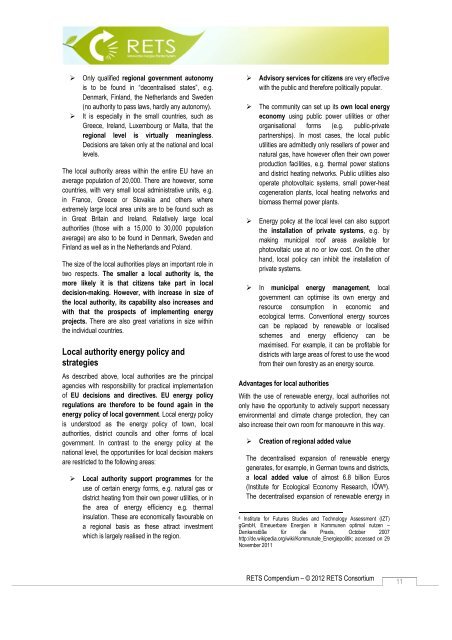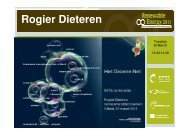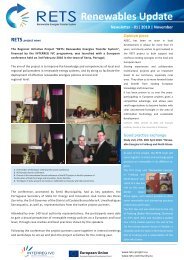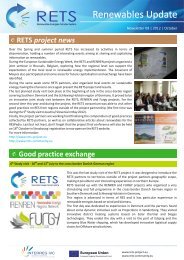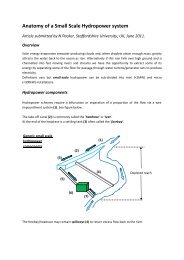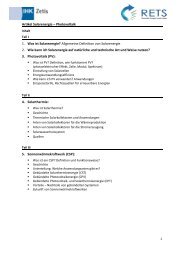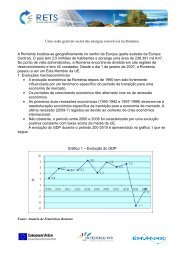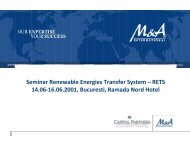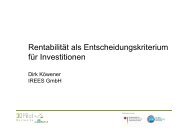Promoting renewable energies - RETS Project
Promoting renewable energies - RETS Project
Promoting renewable energies - RETS Project
You also want an ePaper? Increase the reach of your titles
YUMPU automatically turns print PDFs into web optimized ePapers that Google loves.
Only qualified regional government autonomy<br />
is to be found in “decentralised states”, e.g.<br />
Denmark, Finland, the Netherlands and Sweden<br />
(no authority to pass laws, hardly any autonomy).<br />
It is especially in the small countries, such as<br />
Greece, Ireland, Luxembourg or Malta, that the<br />
regional level is virtually meaningless.<br />
Decisions are taken only at the national and local<br />
levels.<br />
The local authority areas within the entire EU have an<br />
average population of 20,000. There are however, some<br />
countries, with very small local administrative units, e.g.<br />
in France, Greece or Slovakia and others where<br />
extremely large local area units are to be found such as<br />
in Great Britain and Ireland. Relatively large local<br />
authorities (those with a 15,000 to 30,000 population<br />
average) are also to be found in Denmark, Sweden and<br />
Finland as well as in the Netherlands and Poland.<br />
The size of the local authorities plays an important role in<br />
two respects. The smaller a local authority is, the<br />
more likely it is that citizens take part in local<br />
decision-making. However, with increase in size of<br />
the local authority, its capability also increases and<br />
with that the prospects of implementing energy<br />
projects. There are also great variations in size within<br />
the individual countries.<br />
Local authority energy policy and<br />
strategies<br />
As described above, local authorities are the principal<br />
agencies with responsibility for practical implementation<br />
of EU decisions and directives. EU energy policy<br />
regulations are therefore to be found again in the<br />
energy policy of local government. Local energy policy<br />
is understood as the energy policy of town, local<br />
authorities, district councils and other forms of local<br />
government. In contrast to the energy policy at the<br />
national level, the opportunities for local decision makers<br />
are restricted to the following areas:<br />
Local authority support programmes for the<br />
use of certain energy forms, e.g. natural gas or<br />
district heating from their own power utilities, or in<br />
the area of energy efficiency e.g. thermal<br />
insulation. These are economically favourable on<br />
a regional basis as these attract investment<br />
which is largely realised in the region.<br />
Advisory services for citizens are very effective<br />
with the public and therefore politically popular.<br />
The community can set up its own local energy<br />
economy using public power utilities or other<br />
organisational forms (e.g. public-private<br />
partnerships). In most cases, the local public<br />
utilities are admittedly only resellers of power and<br />
natural gas, have however often their own power<br />
production facilities, e.g. thermal power stations<br />
and district heating networks. Public utilities also<br />
operate photovoltaic systems, small power-heat<br />
cogeneration plants, local heating networks and<br />
biomass thermal power plants.<br />
Energy policy at the local level can also support<br />
the installation of private systems, e.g. by<br />
making municipal roof areas available for<br />
photovoltaic use at no or low cost. On the other<br />
hand, local policy can inhibit the installation of<br />
private systems.<br />
In municipal energy management, local<br />
government can optimise its own energy and<br />
resource consumption in economic and<br />
ecological terms. Conventional energy sources<br />
can be replaced by <strong>renewable</strong> or localised<br />
schemes and energy efficiency can be<br />
maximised. For example, it can be profitable for<br />
districts with large areas of forest to use the wood<br />
from their own forestry as an energy source.<br />
Advantages for local authorities<br />
With the use of <strong>renewable</strong> energy, local authorities not<br />
only have the opportunity to actively support necessary<br />
environmental and climate change protection, they can<br />
also increase their own room for manoeuvre in this way.<br />
Creation of regional added value<br />
The decentralised expansion of <strong>renewable</strong> energy<br />
generates, for example, in German towns and districts,<br />
a local added value of almost 6.8 billion Euros<br />
(Institute for Ecological Economy Research, IÖW 6 ).<br />
The decentralised expansion of <strong>renewable</strong> energy in<br />
6<br />
Institute for Futures Studies and Technology Assessment (IZT)<br />
gGmbH, Erneuerbare Energien in Kommunen optimal nutzen –<br />
Denkanstöße für die Praxis, October 2007<br />
http://de.wikipedia.org/wiki/Kommunale_Energiepolitik; accessed on 29<br />
November 2011<br />
<strong>RETS</strong> Compendium – © 2012 <strong>RETS</strong> Consortium<br />
11


